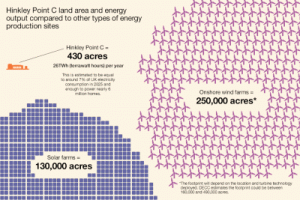Meeting the impending energy shortfall and moving away from fossil fuels to the use of renewable sources will be top priorities for LIFE.
Getting to “carbon neutral” by 2030 is a fairly simple equation: we must double our efficiency, and double our electricity generation. These are less easily achieved targets, and will require perseverence and solidarity from all of us. Doubling our efficiency means doing the same things we do today with half the energy, and if we can’t reach that target then we will have to do less.
Leading through WellFair
LIFE’s policies for WellFair Shelter and Transport will go a long way to getting our housing and transport efficiencies improved. Simply providing free access to local public transport for everyone will take millions of cars miles off the roads every day.
Upgrading housing efficiency
Reducing demand through efficiency is the cheapest and fastest way to meet the challenge of energy supply and tackle fuel poverty. A “negawatt” is cheaper then a new “megawatt”. The liberation of labour markets will make it much easier for Communities to upgrade existing housing stock to reach their efficiency targets.
Local & Micro Generation
LIFE will also encourage and facilitate Community generation projects and microgrids, and set targets for every Community to reach carbon neutrality by 2030. These new generators will provide the competition we need in the energy supply market.
Smart Grid
LIFE will direct the national infrastructure investment bank to focus on the deployment of a national “smart grid” as an urgent national priority. This will stimulate competition, increase resiliance and drive a “green energy” future for the UK.
The Generation Mix
The mix of renewable generation capacity should be decided by the most cost effective methods available, ensuring that all foreseeable costs are included in the calculations. World leading researchers believe that we can reach our goals without nuclear power, because nuclear power takes too long to build and has always been more expensive than alternatives.
 DECC produced this helpful infographic at the announcement of HPC new nuclear plant. Just 20 sq. miles a year of solar would replace that nuclear plant without the risks of insurance and waste management (that the government has guaranteed to cover).
DECC produced this helpful infographic at the announcement of HPC new nuclear plant. Just 20 sq. miles a year of solar would replace that nuclear plant without the risks of insurance and waste management (that the government has guaranteed to cover).
Shale Gas (“Fracking”)
LIFE does not believe that the long term sustainability and safety of this extraction method has been established. In a small and densely populated country like the UK, the risk that our ground will be polluted in the long term by “fracking” is too high to allow it to proceed with current understanding of the implications.
Claims for carbon emissions benefits from fracking do not account properly for GHGs from well casings, throwing any environmental argument in favour of fracking into the rubbish bin.


5 replies on “Energy”
Graphic-Paul-Scruton-for–001.jpg
LikeLike
We need to make progress on efficiency and competitive local production. The ConDem deal to have French and Chinese tax payers fund a new nuclear plant at Hinkley, while the UK tax payer guarantees them a profit and guarantees to absorb all the risks, is a terrible mistake.
In the next 10 years we could add just 20 sq miles of solar a year and get the same increase in production as this new nuclear plant, with less waste risk, no insurance risk, and better distribution.
This article sums it up well: http://www.theguardian.com/environment/damian-carrington-blog/2013/oct/21/nuclear-power-energy-edf-deal
LikeLike
A new study suggests the world is spending seven times more money subsidising fossil fuels than fighting climate change in developing countries.Read more:http://www.bbc.co.uk/news/science-environment-24833153
LikeLike
Interview with manager of the National Gridhttp://www.bbc.co.uk/news/uk-25525439
LikeLike
We need a “whole system” approach to tackle the looming energy infrastructure crisis in the UK. LIFE plans for a National Infrastructure Bank would provide a hub for strategic thinking and investment. http://www.theguardian.com/business/2014/may/06/uk-energy-too-cheap-newcastle-universityhttp://www.uklife.org/nib
LikeLike